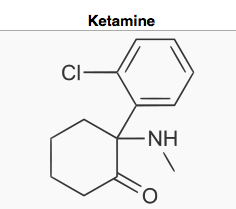Ketamine
The Ketamine Key
The horse tranquilizer helps depressed patients experience pleasure again.
Posted October 24, 2014

Depression, a persistent sad mood and lack of ability to experience pleasure, is a symptom of many psychiatric disorders. It’s debilitating, expensive, and often difficult to treat. Most treatments such as psychotherapy and medications take weeks to kick in, which means lengthy hospitalizations or time off work. Current medications do very little for the lack of ability to experience pleasure (called anhedonia). In fact, SSRIs, the first line medicines for depressive disorders, can make that symptom worse by increasing a feeling of numbness.
The ability to feel pleasure is, in some ways, what makes life worth living. It is also a primary factor in motivation to do things, and a lot of the functional problems that derive from depression are due to lack of motivation or interest. Anhedonia makes it hard to get out of bed, hard to engage in work or fun, hard to care about what happens to ourselves and our loved ones. Anhedonia means you don’t derive as much pleasure from eating, and you don’t look forward to that trip to Bermuda you’ve been planning for a year. Anhedonia is often the very last symptom to get better when one is recovering from depression.

Traditionally, the neurotransmitter thought to be responsible for experiencing pleasure is dopamine. Rodent studies show us that bursts of dopamine from the nucleus accumbens is a key to experiencing reward. These brain areas are a big part of the reason some engage in addictive behaviors. Cocaine and amphetamines are examples of agents that act on the dopamine system in an overwhelming way, causing immediate pleasure, reward, and increase in planning and speeding up of behavior, followed by a crash and feelings of depression, leading to cravings for more. Parkinson’s disease, caused by death of dopamine-producing cells has depression as a key symptom. The dopamine replacement medicines improve both depression and anhedonia in Parkinson's patients. Parkinson’s medicines don’t seem to work for people with depressive disorders not associated with Parkinson’s, however.
Pharmacologic agents that work on the dopamine system in other ways, such as methylphenidate, sometimes help increase motivation and energy in someone with depression, but it can also cause anxiety, insomnia, and jitteriness.
As with everything in the brain, the story isn’t so simple as a single neurotransmitter system like dopamine. Neurotransmitters have complex interactions. Another system using the neurotransmitter glutamate has always been known to be at the heart of depressive disorders. Glutamate is the major excitatory neurotransmitter in the brain, meaning it is the “on” switch. Problem is, if things are put “on” too aggressively or too much, you get what is called “excitotoxicity” leading to neuron damage and even cell death. There’s some evidence that glutamate overload of glutamate receptors like the NMDA receptor may be responsible for the key symptom of depression, anhedonia. Chronic stress seems to damage the nerve synapses.
In a recent paper (news coverage here), researchers described how they used a noncompetitive inhibitor of the NMDA receptor and partial dopamine receptor agonist, ketamine (originally developed as a tranquilizer/anesthetic agent that is now used mostly in veterinary practice and sometimes in children) to rapidly reverse the symptoms of anhedonia in depressed patients. Ketamine has been featured on CBS news for its ability to quickly relieve depression unlike any other pharmacologic agent we have. It is typically used intravenously, and can cause hallucinations and dissociation (in fact it is also known as the club drug “Special K"). However, it seems to be able to reverse damage to the synapses caused by chronic stress, and relieve the symptoms of depression very quickly, within 30-40 minutes.

The down side to ketamine (besides lack of FDA approval for depression, the hallucinations, and lack of general availability) is that the effects don’t last. If you are lucky, you get a couple of weeks, then the depression comes back. Researchers and doctors, however, are hoping ketamine could be used as a bridging agent in seriously depressed, hospitalized patients, allowing them to feel better immediately while other, longer acting but much slower onset agents have a chance to get into the system and do their work. The immediate reversal of the key symptom of anhedonia may be an even more important lesson we can learn from the use of ketamine.
In the latest study, patients with bipolar disorder, currently depressed, went to the National Institutes of Health. They were each given an infusion of ketamine or placebo, then crossed over to the other treatment/placebo after a two week period. While technically this was a double blinded study, since the ketamine causes immediate drug effects, hallucinations, and dissociation, it was likely the patients knew whether or not they were receiving drug or placebo. Brain metabolic activity was measured using a PET scan for 2-3.5 hours after the infusion.
Scale measures of anhedonia were significantly decreased over several measures across the 14 day period after ketamine infusions, meaning ketamine is the first treatment that can rapidly decrease anhedonia in depressed patients. The researchers were also able to find specific areas of the brain in patients who responded to ketamine that had increased metabolism on the PET scans, specifically the right dorsolateral prefrontal cortex, the dorsal anterior cingulate cortex, the putamen, and some other key areas already known to be associated with depression symptoms. It could be these areas are specifically related to the experience of pleasure and, its counterpart, anhedonia.
One other fascinating part of the study is that the bipolar patients who were on lithium had a better anti-anhedonic response to ketamine than those who were taking another mood stabilizer called valproic acid. It may be that lithium works together with ketamine to increase the metabolism in particular areas of the brain, restoring the ability to experience pleasure.
It is suspected that the glutamate system effects of ketamine may lead to dopamine effects downstream, thus reversing anhedonia. The more we can understand about these brain systems and how they interact, the better a chance we have to develop sophisticated tools to fight depression.
Image credit: ketamine structure from wikipedia
Image credit flickr creative commons
Image credit flickr creative commons
Copyright Emily Deans, M.D.




